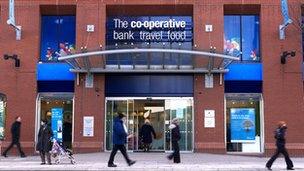Co-operative Bank halts new business lending
- Published

The Co-op's lending to retail customers is unaffected
Co-operative Bank has stopped offering new business loans amid concerns over its capital position.
The bank is continuing to provide lending to existing customers, but has frozen lending to new corporate customers.
Lending to individual retail customers is unaffected.
The bank is currently in discussions with UK financial regulators over the amount of cash it needs to hold in reserve, along with other UK banks.
In a statement, the Co-op said the decision to freeze new business lending was part of "an extensive review of the Co-operative Bank, its capital and lending position and its commercial strategy", which it said was "ongoing".
Balance sheet concerns
"An early decision, taken in March of this year, was that the primary focus of the banking business is to be directed at serving and expanding our presence amongst retail customers, whilst continuing to support our existing business customers," the statement said.
"We would not, at this time, look to grow our corporate lending business by lending to new corporate customers."
Earlier this month, the rating agency Moody's downgraded the Co-op's debt rating to "junk" status, citing concerns over the strength of the bank's balance sheet.
The UK bank regulator, the Prudential Regulation Authority (PRA), is currently talking to banks about whether they need to raise more capital to shore up their cash reserves, including the Co-op.
In March, the Bank of England said UK banks needed to raise cash reserves by £25bn over the next year, but did not give details of which banks were in need of cash.
Lloyds Banking Group and Royal Bank of Scotland have already announced that they do not need to raise money externally to meet capital requirements.
Analysts say the announcement from the Co-op suggests it has significant capital problems.
"With this decision the Co-op confirms that they have a serious capital deficiency which could be very difficult for them to solve with the business intact," said Eva Olsson, an analyst at Mistubishi UFJ Securities.
"In my view this is very substantial and negative news. The corporate business accounts for roughly a quarter of the total loan book, so almost a quarter of the loan book is in effect in run-off now.
"Unless the situation can be resolved relatively urgently it could be difficult to regain a strong position in the business area."
- Published22 May 2013
- Published10 May 2013
- Published27 March 2013